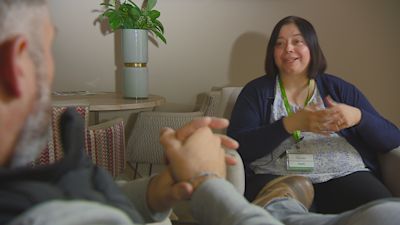County Durham hospice facing huge rise in demand for bereavement services after lockdown

A North East hospice is seeing a huge rise in the number of people coming forward for bereavement support following the loss of a loved one during the pandemic.
Willow Burn Hospice in County Durham has doubled the help it provides but is unable to meet the demand from both adults and children.
Many of those coming forward feel the normal grieving process was put on hold as a result of Covid restrictions, irrespective of how their loved one died.
Family Support Coordinator Joanne Snowdon said people may have been unable to see dying family members, hold the funeral they had intended or carry out the last wishes of someone they held dear.
As a result, Ms Snowdon said those seeking support can be struggling with a range of emotions.
She added: "Some trauma, traumatic memories, helplessness, injustice, guilt, not being able to control the situation. Shock and disbelief that such a thing could ever happen."
Barry Cartmell attends monthly sessions at Willow Burn Hospice, after losing his wife Heather to breast cancer in January 2020.
Soon after her death, the country went into lockdown and Mr Cartmell said he and his three children were left isolated at their time of greatest need.
He said: "I felt like I lost out the first two years of really grieving for my wife and getting everything out on the table whereas now, it's happening now and it's affecting us terribly."
Mr Cartmell says he is now beginning to address the loss of his wife, but describes it as a "delayed massive reaction" and feels the consequences may affect him for the rest of his life.
Willow Burn, on the outskirts of Lanchester, is the North East's smallest hospice.
It covers an area of north County Durham which takes in towns such as Consett, Shotley Bridge and Chester-le-Street.
Its director, David Barker explained it runs on a total budget of £1.2m per year.
Around half of that money is obtained from government, with the rest found through fundraising.
Bereavement support runs alongside other services provided by the hospice, including an in-patient unit for people requiring end of life care.
Mr Barker said despite scaling up its bereavement support services, it is impossible to help everyone who comes forward.
He said: "The demand is much bigger than we can supply. I wish we could do more but we can't."
He added: "All hospices have limited income. We all get some money from government and we augment and support that with money from our own fundraisers and our own charitable activities."
According to Joanne Snowdon, the issues faced by those bereaved during Covid restrictions are likely to continue.
She said: "I think we're looking at many years to come before we can say the Covid pandemic is no longer affecting bereavement and people living with bereavement."
The Department of Health and Social Care told us the pandemic has highlighted the "essential work" of organisations providing bereavement support as well as the strain they are under.
It said that NHS England has developed guidance for those commissioning services at local level to ensure there is sufficient access to bereavement support services.
More generally, the department said it had made £350 million available to hospices nationwide.
Want a quick and expert briefing on the biggest news stories? Listen to our latest podcasts to find out What You Need To know...